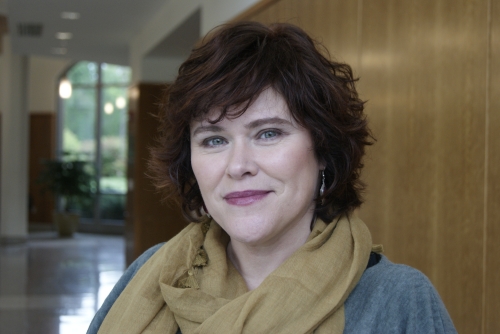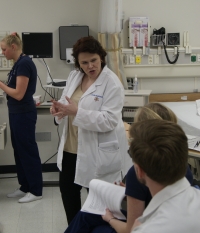Dr. Linda Maldonado’s mission for the health of mothers and babies

Linda Maldonado, PhD, RN, wants to empower Latina mothers through her research. Why is the assistant professor – an expert in maternal-child health – concerned about their welfare? “We know that of all the Latina subgroups, Puerto Rican women have the poorest maternal/fetal outcomes,” she notes. She further explains that these women in particular are exposed to various stressors which include “fear of loss of work and other financial concerns due to pregnancy, concerns over neighborhood crime, and the stress of the cultural expectation that they (often singularly) care for older family members while simultaneously caring for their own family and themselves.” This is the basis for her scholarly endeavors.
“I am examining how Latinas, particularly childbearing Puerto Rican women, are negotiating multiple roles of caring for older family members, their own children, and themselves during pregnancy while living in an urban setting (Philadelphia),” Dr. Maldonado says, adding “How these stressors, over time, affect their maternal/fetal outcomes is one of the foundational questions I am asking.”
Her goal is a patient-directed solution to counter the high rates of missed prenatal care and thereby preventing the poor maternal/fetal outcomes specifically found in the Puerto Rican sub-group of Latinas. “My research is currently in its early stages with individual interviews and focus groups but eventually will be ready for the intervention building phase,” Dr. Maldonado offers.
She has a very personal connection to her study population. Dr. Maldonado’s mother is from Puerto Rico and many of her family members have settled in large urban areas of the United States. They, too, have experienced some of the same stressors as the childbearing Latinas in her research. A solution is important to her.

“The research study will ultimately lead to a proposed intervention that the women, themselves, will help to create and enact,” says Dr. Maldonado. She is also mentoring Villanova Nursing students as she progresses from her pilot projects to larger initiatives. The students are assisting in every facet of the often-challenging process of running focus groups. Dr. Maldonado describes their work, “These focus groups held at Philadelphia’s Temple University Hospital involve directly interacting with the OB clinic staff, research participants, their families, and their children. Everyone has shown a great level of appreciation and positive reception towards the Villanova undergraduates.”
In March, the researcher presented A Latina Intergenerational Caregiving Model, an overview of her research at Villanova, at the Women’s Health in Global Perspective Conference at the School of Policy, Government and International Affairs at George Mason University.
Dr. Maldonado was also selected as a 2016 National Institute of Minority Health and Health Disparities (NIMHD) Health Disparities Research Institute Scholar, after a competitive process among 500 applications. She was one of five nurses chosen for the honor because of her accomplishments to date and interest in health disparities. Dr. Maldonado noted that attendees included top epidemiologists, public health researchers, bioethicists, economists, and health policy researchers as well as numerous physicians from a multitude of specialties whose research focuses on minority health disparities.
The Institute took place in August in Bethesda, Md. She was “trained in building innovative community and population-level interventions to reduce and encourage the elimination of health disparities” and enjoyed a mock review of an actual National Institutes of health (NIH) grant. She also had the opportunity for her own grant to be reviewed by a senior research officer. “I was able to gain valuable insight as to how to improve and fine tune the work that I am doing with my Latinas and Intergenerational Caregiving project,” explains Dr. Maldonado. Her goal is an eventual application for an NIH grant with the NIMHD.
She keeps that mission in sight every day, pointing out, “The NIH grant I hope to get will build on the pilot work I am conducting now to work with both community stake holders and the Puerto Rican women themselves, to build a community intervention aimed at reducing the high number of poor maternal/fetal outcomes in this particular subgroup of women.”
